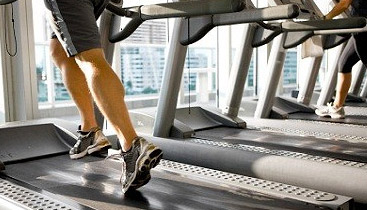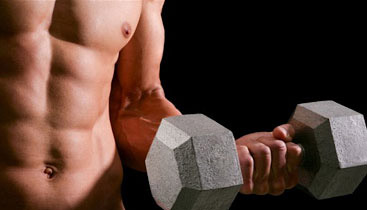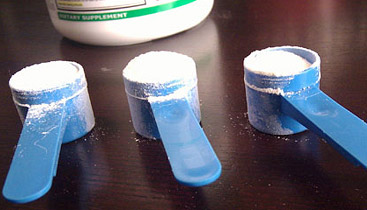BODYBUILDING AND FAT LOSS Q&A WITH SEAN NALEWANYJ: PART 5
Alright guys, I’m back again with Part 5 of my no nonsense, straight-to-the-point Bodybuilding And Fat Loss Q&A with some more important tips to hand you related to proper training, nutrition and supplementation.
If you missed any of the previous 4 installments you can use the links below to go back and access those if you’d like:
– Part 1
– Part 2
– Part 3
– Part 4
Now onto today’s questions…
Q: What are your top recommended cardio exercises for burning fat in the most effective way?

Cardio is simply a calorie-burning tool to be used in conjunction with proper diet for the purpose of maintaining an ongoing calorie deficit over time.
Ultimately, ANY form of exercise that increases your heart rate and allows you to generate a reasonable amount of intensity over a sustained period of time is going to be an acceptable form of cardio exercise.
For that reason, my recommendation is to choose your cardio method with the goal of overall adherence in mind first and foremost. In other words, just go with the forms that you enjoy the most and that you’ll be most likely to stick to over the long term.
You’ll still end up getting the same basic results in the big picture this way, not to mention that it will turn your day to day training program into something that you’ll actually look forward to as opposed to something you have to “get over with”.
If that means using traditional gym equipment such as treadmills, stationary bikes and stairsteppers then that’s totally fine. But it could also mean other activities as well, such as swimming, jumping rope, heavy bag work, hiking, rock climbing etc.
It could mean using kettlebells or performing barbell complexes… it could mean playing sports a couple times a week… it could mean drop-in classes such as TRX, spin, kickboxing or faster-paced yoga.
Again, just get creative and find activities that allow you to meet the demands of the specific cardio form you’re aiming for (whether it be longer duration/lower intensity or shorter duration/higher intensity) and then choose them based on personal preference.
Just make sure to use some common sense if building muscle size and strength is a central goal of yours by making sure that whatever cardio form you choose doesn’t interfere with your actual weight training workouts.
For example, you wouldn’t want to go rock climbing immediately before or after a back workout, or perform intensive heavy bag work close to a chest/tricep workout.
Q: How should one’s training plan be structured if the goal is simply to build a modest amount of muscle and achieve a more “athletic” look as opposed to a bulky “bodybuilder” look?

Whether someone is aiming to get as big and strong as they possibly can or just put on a modest amount of muscle, the basic workout plan I’d give to either one would ultimately be the same and would still be based on increasing muscle size at the fastest possible rate.
This is because achieving significant muscle growth as a natural trainee is a very slow and gradual process, and intentionally trying to slow down your rate of progress out of fear that you’ll get “too big” is just downright counterproductive.
With a standard rate of lean muscle growth of around half a pound per week for the complete beginner, there is absolutely no realistic scenario where you’ll wake up one day to realize that you’ve accidentally “gone too far”.
Instead, you’ll always see your gains unfolding from a mile away and will be able to easily modify your approach as they come depending on your preference.
So whether you’re male or female and whether you want an “athletic” physique or a “bodybuilder” physique, the basic training protocol should be the same.
You should be centering your program around basic compound exercises, training with a reasonably high level of volume and intensity, sticking to a moderate rep range and placing all of your focus on achieving progressive overload over time.
Just focus on maximizing your overall rate of progress, and if a situation eventually arises where you’re satisfied with your level of development and want to scale back, you can then make the necessary adjustments to your plan to allow for muscle maintenance rather than further growth.
Q: With so many different pre-workout supplements available these days it can be confusing to know which ones are really worth it. What do you recommend in this area?

To be honest, not a whole lot. This is a category of supplements that has gotten completely out of control over the past few years, with most trainees placing far too much value on them as well as spending far too much money on them.
The majority of popular pre-workout products available hide their ingredient dosages behind a proprietary blend, and even those that do list the specific amounts are typically under-dosed anyway.
Couple that with the fact that they typically contain way more ingredients than is actually necessary (many of which are not backed by good supportive research in the first place) and pretty much always have an excessively inflated price tag for what you’re getting, and you’d really just be best off to avoid most popular commercial pre-workout supplements altogether.
Since the majority of the performance-boosting benefits that you obtain from these products is simply a result of the caffeine content anyway, you can very easily make your own effective homemade pre-workout blend using a few simple ingredients and for a fraction of the cost.
My favorite “basic” pre-workout combination as is as follows, taken 30-45 minutes prior to training:
Caffeine Anhydrous: 100-200mg
(if you have a particularly high tolerance you can increase this to 300mg)
L-Tyrosine: 1000-3000mg
The caffeine will increase your energy levels and mental focus while reducing muscular fatigue, while the l-tyrosine will work downstream from the caffeine to amplify its effects further without any additional “jitters”.
This stack is simple, easy and will deliver the majority of the effects you’d get from a typical commercial pre-workout, but for a much lower cost.
If you want a slightly more potent combination, you can consider adding in 1-2 grams of acetyl l-carnitine and/or 6-8 grams of citrulline malate as well, however, this just depends on your individual tolerance/preference and how much money you want to spend on pre-workout supplementation.
Q: What types of carbohydrate sources should a properly structured muscle building or fat burning diet be based around, and which sources should be avoided?

Proper carbohydrate selection doesn’t need to be anywhere near as complicated as most people make it out to be, and there are only a couple of basic “rules” that I’d recommend you follow.
First off, keep in mind that when it all comes down to it, carbohydrates are just sugar. So whether you consume a bowl of rice, an apple or a chocolate bar, it all eventually gets broken down into basic glucose one way or another.
The only difference is in how those carbs are “packaged up”. Some are found in high fiber, nutrient dense food sources (like fruits and vegetables) while others are found in foods that may contain little to no fiber or nutritional value (like sugary drinks or other typical “junk food”).
Since consuming adequate fiber, vitamins, minerals and phytonutrients is an important part of fueling your body for optimal muscle growth, fat loss, gym performance and overall health, your main goal should just be to get the bulk of your carb intake (at least 80%) from minimally processed, higher fiber sources.
Examples include foods like fruits, vegetables, oatmeal, rice, potatoes, quinoa, whole grains etc.
Then, to gain extra insurance that your body’s micronutrient needs are being met, make sure to get in 2 servings of vegetables and 1-2 servings of fruit per day as part of that total.
From there, as long as at least 80% of your carbs are coming from these types of foods, the rest can be made up of whatever sources you’d like as long as it fits into your daily totals. (Yes, you CAN have a few cookies or some ice cream or a chocolate bar without your fitness program imploding.)
It’s really as simple as that. As long as you’re following these basic guidelines then there’s really no need to analyze your carbohydrate intake any further.
Q:Are genetics really that important when it comes to building muscle? Just how big of a role do they play?

The simple answer is that, as with most things in life, yes, genetics do play a fairly significant role in determining how quickly or slowly an individual will gain muscle assuming their training and nutrition plan are properly structured.
There are many different factors that come into play, such as muscle fiber type distribution, testosterone levels, growth hormone levels, metabolic rate, neuromuscular efficiency and recovery ability just to name a few.
On top of this, certain genetic factors will also play a role in governing how your actual physique will appear once you’ve put on a significant amount of muscle, such as your underlying muscular shape, muscle insertion points and bone structure.
This is just the simple fact of that matter, and anyone who tries to tell you that genetics don’t play a role or that individual muscle building progress is 100% a result of “hard work only” is full of it.
That said, there are two important things I’d point out here…
First off, although there are some people out there with exceptionally “good” muscle building genetics as well as those with particularly “bad” muscle building genetics, the vast majority of the population will fall somewhere in the middle.
Don’t let your perception be skewed by muscle magazines and the physiques you see online with crazy muscle development and shredded six packs year round. This only represents a very, very select minority of the population, and many of these people aren’t even natural athletes to begin with.
And secondly, regardless of your individual genetic capacity for gaining muscle, it really has no practical relevance to your program anyway.
In the absence of some underlying health condition, virtually anyone can build a significant amount of muscle size and strength given enough time and consistency. For some people it may simply take a shorter or longer period of time than average.
So, the whole concept of “genetics and muscle growth” is totally irrelevant, and your only job is to train hard, eat right, stay focused, and good things will happen as long as you remain consistent.
Thanks for checking out this Q&A. I hope it was helpful and I’ll be back again soon with Part 6.
If you found this article helpful, make sure to sign up for your FREE custom fitness plan below...




